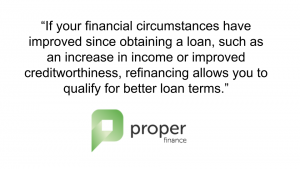
What is a Senior Stretch Loan?
A senior stretch loan can help you purchase a property …
Yes it is certianly possible to refinance your secured loa. If you currently have a secured loan and are looking for ways to potentially reduce your monthly payments or secure better loan terms, refinancing might be a viable option. Refinancing a secured loan involves replacing your existing loan with a new loan, typically with different terms and conditions.
Loan refinancing refers to the process of taking out a new loan to replace an existing one. The goal of refinancing is often to secure more favourable terms, such as a lower interest rate, extended repayment period or different payment structure. By refinancing, borrowers aim to improve their financial situation, reduce monthly payments or save on overall interest costs.
There are a number of reasons you might need to refinance your secured loan:
Change In Circumstances
If your financial circumstances have improved since obtaining the loan, such as a significant increase in income or improved creditworthiness, refinancing allows you to qualify for better loan terms. For example, you may secure a lower interest rate, resulting in reduced monthly payments or overall interest costs.
Change In Employment Or Income
If you have experienced a change in employment status, such as transitioning from a salaried employee to self-employed or facing a decrease in income, refinancing can help you manage your financial obligations. By refinancing, you can negotiate new repayment terms that better align with your current situation.
Needing Additional Funds
Refinancing a secured loan enables you to access the equity in your property, providing you with additional funds for specific purposes. Whether it’s home renovations, education expenses or debt consolidation, refinancing allows you to secure a better loan structure that meets your current financial needs.

The ability to refinance a secured loan depends on various factors, including the type of loan, the lender’s policies and your financial circumstances. In general, it is possible to refinance a secured loan, such as a mortgage or a secured loan against property.
To use the example of refinancing a mortgage, there are a few key considerations to keep in mind:
Refinancing a secured loan can offer several potential benefits:
While refinancing a secured loan can be advantageous, it’s important to consider the following:
Refinancing a secured loan is indeed possible and can potentially offer significant benefits, such as lower interest rates, extended repayment periods and improved loan terms. However, it’s essential to carefully evaluate your financial situation and take time to consult with lenders and financial professionals who can help you make an informed decision and find the best refinancing options available to you.

A senior stretch loan can help you purchase a property …

A mortgage offer officially lasts for 3-6 months depending on …

If you have purchased a car through a dealership using …